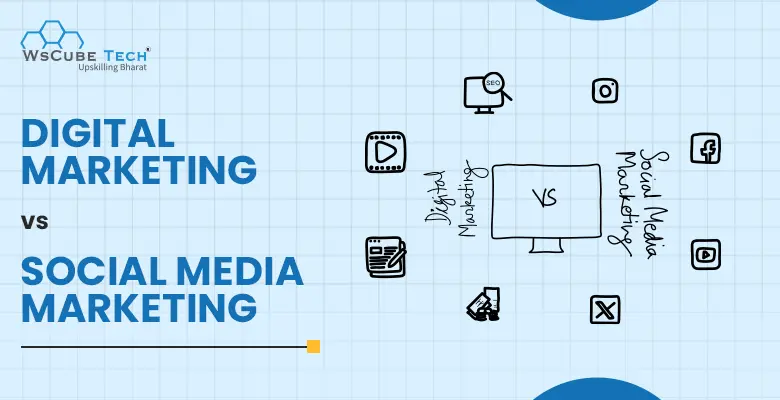Digital marketing needs no introduction. With all leading companies and brands relying on the internet and online platforms, it has become a ubiquitous concept in the marketing world. It is a broad domain that includes multiple techniques and channels, such as emails, social media, websites, etc.
Many people often use social media marketing and digital marketing as synonyms, assuming them to be the same. Although the two marketing strategies share common tools and platforms, they are two distinct marketing tactics. Marketing professionals use them simultaneously to boost their marketing initiatives and efforts.
This blog dives deeper into the difference between the two, comparing digital marketing with social media on various parameters.

What is Digital Marketing?
Digital marketing refers to promoting products, services, and brands via digital channels and platforms. Marketers and businesses use digital platforms and media to customize their marketing strategies to promote and create brand awareness among the target audience. They build influential relationships with customers using the internet and digital marketing, which include emails, social media, websites, SMS, etc.
Companies use multiple digital marketing strategies, such as affiliate marketing, PPC, SEO, email marketing, content marketing, e-commerce marketing, and more, at a time to reach a global audience and sell their products. As we compare social media & digital marketing, you need to know that the latter is an umbrella term that includes the former.
One can learn complete digital marketing with an online digital marketing course.
The following are the vital steps involved in digital marketing:
- Identifying the target audience
- Setting clear goals
- Understanding market trends and customer demands
- Building a comprehensive digital marketing strategy
- Selecting the right platforms
- Executing marketing campaigns
- Tracking and measuring results
Upskill Yourself With Live Training (Book Free Class)
Also Read: Top 10 Latest Digital Marketing Trends & Predictions 2024
Types of Digital Marketing
To help you understand the difference between social media marketing and digital marketing, it’s crucial that you also learn their types. A successful digital marketing strategy includes the following tactics that you can adopt depending on your requirements.
- Search engine optimization
- Content marketing
- Social media marketing
- Email marketing
- Affiliate marketing
- Mobile marketing
- Influencer marketing
- Pay-per-click (PPC)
We have explained a few of these strategies in the following section:
1. Search Engine Optimization (SEO)
SEO is the essence of digital marketing that involves keyword research and content optimization so that the website ranks higher on Google search engine result page and other search engines. People who want to specialize in this field should go for the best online SEO course.
2. Content Marketing
It refers to strategizing and creating on-page and off-page content plans to reach the target audience and increase website traffic.
3. Social Media Marketing (SMM)
Social media marketing involves building community and engaging users on social media channels, such as Instagram, Facebook, Twitter, and LinkedIn.
4. Pay-Per-Click (PPC)
PPC is the paid advertisement strategy where brands pay a fee to search engines or publishers every time a user clicks on their ads.
5. Email Marketing
It means connecting with leads by sending emails to inform them about the latest events, offers, deals, and blogs. You can become skilled in this field with a free email marketing course.
Also Read: How to Make Money in Digital Marketing? 12 Best Ways 2024
Advantages of Digital Marketing
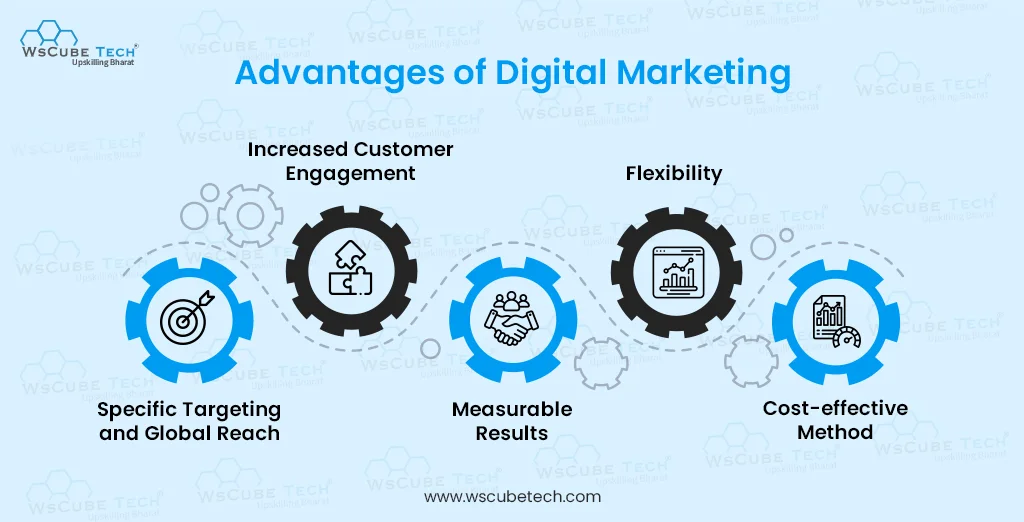
Let’s take a look at some of the benefits of digital marketing:
1. Specific Targeting and Global Reach
Digital marketing gives you a chance to target a specific section of audiences based on age, location, behavior, interests, and other factors. In addition, it is an effective way to reach people worldwide through various channels and mediums, such as websites, social media, blogs, and emails.
2. Increased Customer Engagement
Digital marketing uses interesting and creative ideas to engage and interact with the target customers. This builds brand loyalty and creates awareness around the brand or product.
3. Measurable Results
You can track, assess, and measure the results of marketing campaigns using real-time data. You can adjust budgets, track the effectiveness of your campaigns, make improvements, and make data-driven decisions.
4. Flexibility
As digital marketing comprises various channels and tactics, such as email marketing, SEO, content marketing, PPC, affiliate marketing, mobile marketing, etc., businesses can tailor their approach to meet specific objectives and requirements.
5. Cost-effective Method
Digital marketing is more cost-effective and affordable than traditional marketing methods. Even small companies and startups can compete with big brands using different online marketing strategies.
Disadvantages of Digital Marketing
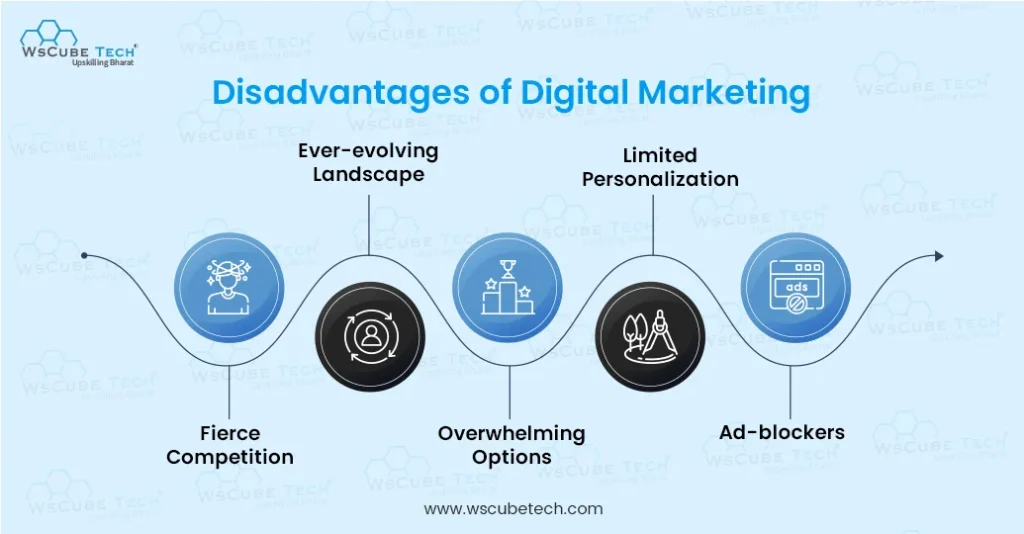
The following digital marketing cons will help you learn more about the difference between social media and digital marketing:
1. Fierce Competition
Digital marketing has created a highly competitive environment on the internet, so businesses need to constantly upgrade and adapt their strategies to stay ahead of their competitors.
2. Ever-evolving Landscape
The digital marketing industry is changing every day. What worked yesterday might not yield any result today. So, you must stay on your toes and invest enough time and effort in continuous learning and upgrading.
3. Overwhelming Options
There are numerous digital marketing platforms and methods. Selecting the right one that works for your brand can be tricky and demands a trial-and-error approach.
4. Limited Personalization
Digital marketing can sometimes be restricted when it comes to personalization and adding a human touch.
5. Ad-blockers
Customers often use ad-blockers or skip ads, which limits the effectiveness of paid ads and marketing efforts.
Interview Questions for You to Prepare for Jobs
| Digital Marketing Interview Questions | SEO Interview Questions |
| Email Marketing Interview Questions | Content Writing Interview Questions |
What is Social Media Marketing?
Now that you have insights into digital marketing, it’s time to get familiar with social media marketing.
When we talk about digital vs social media marketing, the latter is used by companies and advertisers to engage and connect with potential customers directly. It is the process of promoting products or services, engaging with followers, reaching maximum users, and launching ad campaigns via social media platforms.
Companies use Facebook, Instagram, Twitter, LinkedIn, and other channels to tell the target users about the latest events, post stories, images, or videos, interact with users through live chat, and conduct Q&A sessions. All these activities aim to attract more people and create a separate space for your brand.
As social media is becoming easily accessible to more people, businesses are tapping into this channel to promote their products, brands, and content. However, they need to come up with fun and out-of-the-box ideas for their posts and content. This demands more time and effort in designing well-planned social media strategies.
There are two methods of advertising products or services on social media:
- The first one is to increase followers, connections, and fans on social media by posting useful and eye-catching content, videos, contests, and stories.
- The second way is using paid advertising, such as Google Ads and Facebook Ads, to target specific audiences.
Another point to note in social media marketing vs digital marketing is how the two work. The following points explain the process of social media marketing
- Identifying the target customers
- Setting marketing goals
- Selecting platforms for campaigns
- Creating posts and content
- Scheduling posts
- Running campaigns and optimizing them
- Interacting with the audience via comments and posts
You can become pro in this field with an online social media marketing course.

Also Read: Social Media Marketer Skills 2024 (Full Guide)
Types of Social Media Marketing
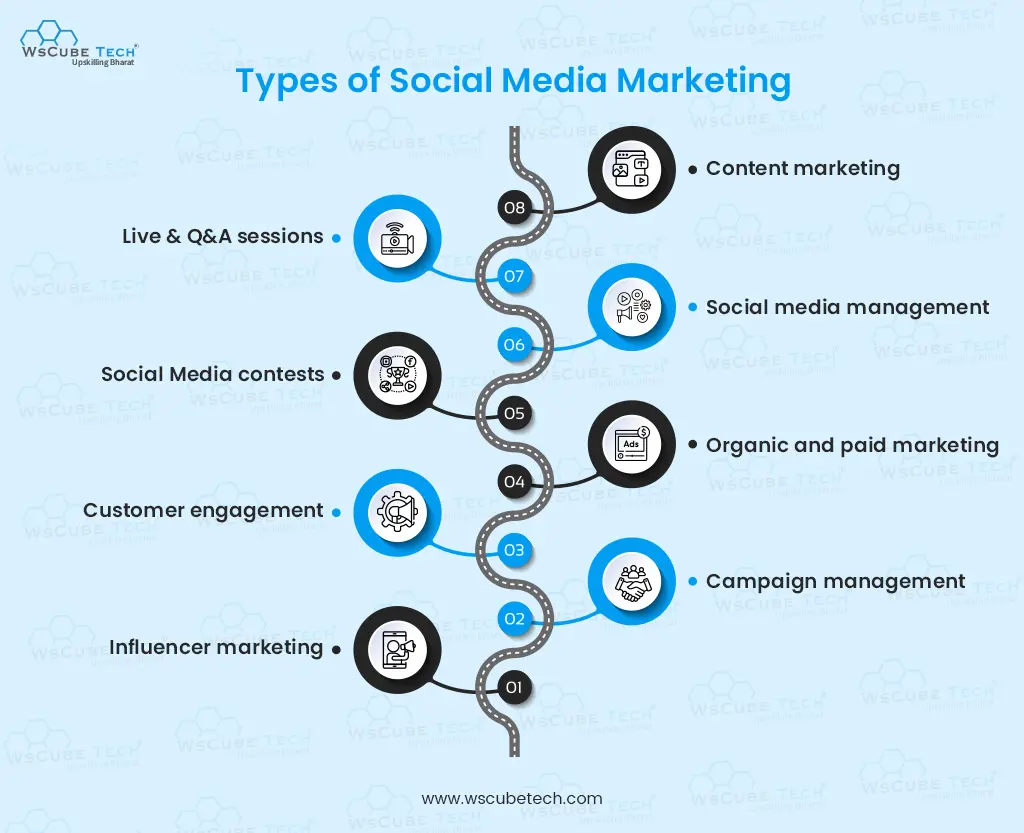
As we mentioned, social media is a part of digital marketing. However, many companies consider it a separate area of marketing, and the team follows the best practices to run successful campaigns. Here, we have discussed different elements of social media marketing strategies:
- Influencer marketing
- Campaign management
- Customer engagement
- Organic and paid marketing
- Social Media contests
- Social media management
- Live and Q&A sessions
- Content marketing
We have explained some of the social media marketing tactics below to help you get a clear picture of digital marketing versus social media marketing:
1. Influencer Marketing
It involves promoting a brand by hiring influencers or famous personalities with huge social media following. They endorse your products to create awareness, increase customer engagement, and boost sales.
2. Social Media Advertising
It is a paid marketing method where companies run paid ads on different channels.
3. Social Media Management
It refers to developing strategies, creating content, analyzing the target audience, collaborating with influencers, monitoring online mentions and conversations, interacting with users, and measuring results.
4. Content Marketing
Social media marketers are also responsible for curating different forms of content, such as graphics, images, videos, texts, and e-books, and distributing them across different channels.
Also Read: How to Learn Digital Marketing? 2024 Guide
Advantages of Social Media Marketing
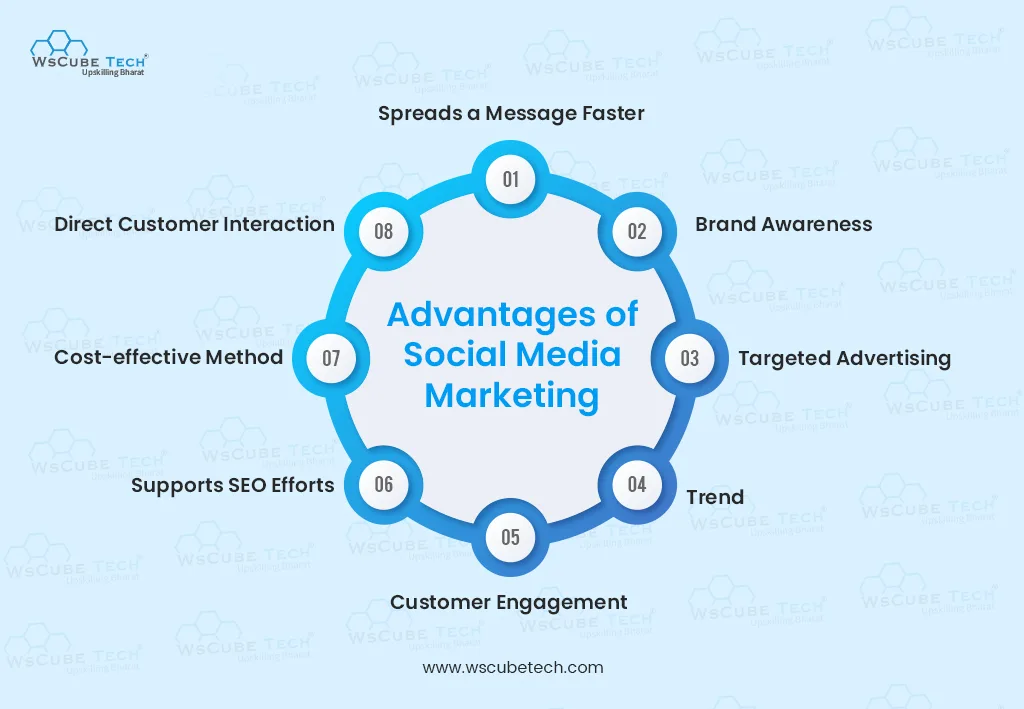
1. Spreads a Message Faster
With a massive fan base and following, your one post or message can reach thousands of users worldwide within a day or two. You can make announcements or send a message to people in the fastest way possible.
2. Brand Awareness
Businesses can build brand awareness and reach more people by interacting with users and sharing relevant content regularly.
3. Targeted Advertising
You can leverage advanced targeting options to reach the audience based on their interests, demographics, location, and other factors.
4. Trend
With billions of social media users, you can’t ignore this channel to stay connected with potential customers and find out what’s happening in the industry.
5. Customer Engagement
You get a platform to engage with customers directly and build strong relationships with them, which results in customer loyalty and retention.
6. Supports SEO Efforts
Social media indirectly boosts your SEO efforts by diverting traffic to the website.
7. Cost-effective Method
When we compare digital marketing with social media marketing, one thing is common between the two. Both are budget-friendly marketing strategies. So, even small businesses can reach a larger audience without straining their budgets.
8. Direct Customer Interaction
Brands use social media to talk directly with their customers via messages, comments, live and Q&A sessions, contests, voting, etc. This allows them to know what buyers think about their products and what they can do better to meet their demands.
Disadvantages of Social Media Marketing
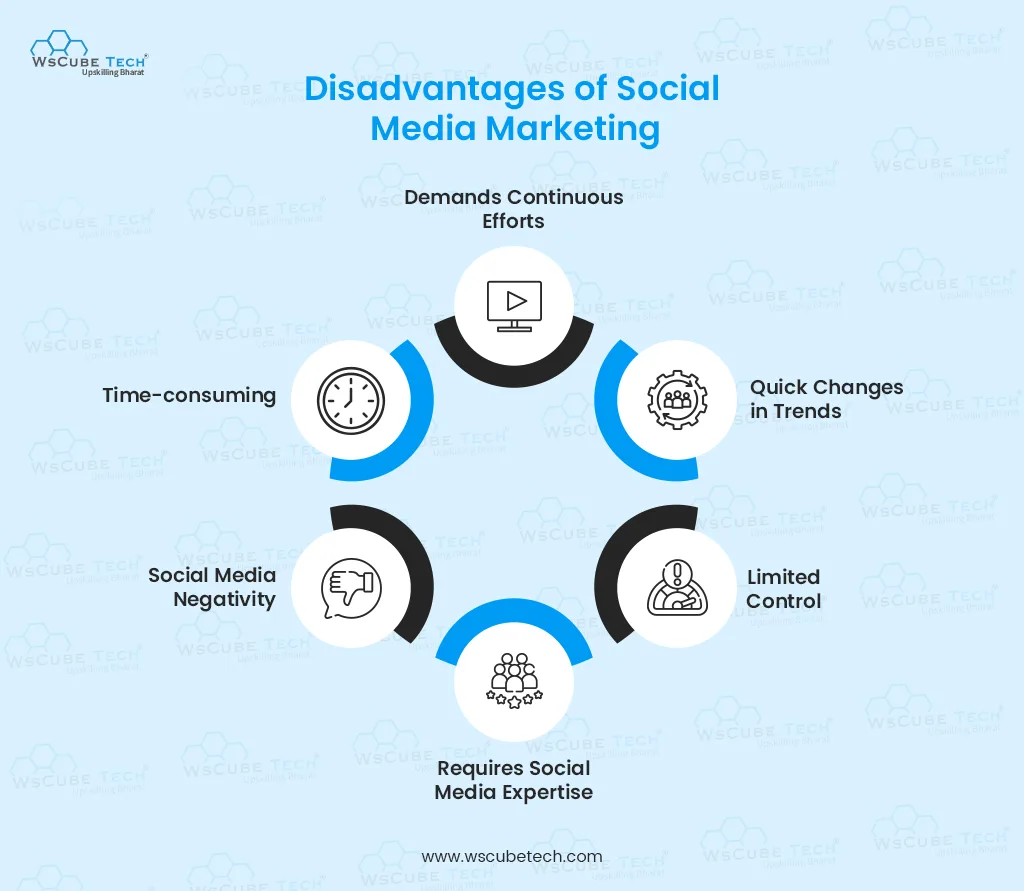
1. Demands Continuous Efforts
Social media marketers have to regularly create and post interesting content on their channels to stay connected with users and increase their followers.
2. Quick Changes in Trends
We need not mention how quickly social media trends change. So, marketers must stay updated with the latest events and happenings and post accordingly.
3. Limited Control
As social media channels are third-party platforms, businesses have no control over changing algorithms and policies.
4. Requires Social Media Expertise
You need a skilled professional to run paid ads on social media and generate desired results.
5. Social Media Negativity
We have all seen how a single post or content can generate negative feedback and impact a brand’s reputation. Therefore, marketers always have to be careful while creating posts to avoid any negative publicity.
6. Time-consuming
Curating social media content, replying to all comments and messages, engaging with the audience through live chats, and monitoring metrics require consistent time and effort.

Digital Marketing vs Social Media Marketing
Digital marketing is a wider concept that includes social media marketing. Although the two marketing strategies aim to engage the target audience and increase conversions, they are quite different from each other.
| Parameters | Digital Marketing | Social Media Marketing |
| Marketing Channels | Digital marketing uses emails, social media, websites, and other online platforms. | Social media marketing channels include Twitter, Instagram, Facebook, WhatsApp, LinkedIn, and Facebook. |
| Key Aspects | Banners, content, images, and videos are used as key aspects to promote products or services. | Content plays a key role in social media marketing. |
| Factors Affecting Success | The success of digital marketing strategies depends on banner advertisements across different digital platforms. | The success of social media marketing tactics depends on posting new and innovative content regularly across different social media channels to interact with the audience and engage them with the brand. |
| Audience Engagement | Audience engagement is based on blog posts, website visits, social media platforms, and emails. | Audience engagement depends only on social media platforms. |
| Strategy | SEO, email marketing, SMM, content marketing, affiliate marketing, and PPC are common digital marketing strategies. | Social media marketing strategies include blog posts, videos, images, carousels, and podcasts. |
| Goal | The aim of digital marketing is to acquire new customers, drive traffic to the website, create brand awareness, and increase conversions. | The main goal of social media marketing is to drive traffic to the website, generate leads, and increase sales. |
| Results | Results are comparatively slow. | Results vary according to likes, shares, and comments of users. |
| Cost-effectiveness | As it uses advanced and emerging technologies, it can be expensive for small businesses. | Social media platforms allow marketers and small companies to post content without shelling out a penny. |
Free Courses for You
| Course Name | Course Name |
| Google Tag Manager Course | Affiliate Marketing Course |
| Semrush Course | Video Editing Course |
| Blogging Course | Email Marketing Course |
| Shopify Course | Photoshop Course |
Conclusion
There is no denying that social media is one of the most popular and powerful marketing tools to interact with the target audience and promote brands across multiple channels. However, digital marketing includes other components that are as effective as social media marketing. Companies rely on a range of digital marketing methods and techniques, such as SEO, email marketing, affiliate marketing, PPC, content marketing, etc., to drive traffic, build brand awareness, and increase conversions.
What strategy works for you depends on your brand, target customers, and industry trends. Other forms of digital marketing can be more appropriate and effective for your business, but it’s always recommended to include social media in promotional campaigns to reach wider audiences.
To become a proficient digital marketer, join the complete digital marketing course.
Read more blogs:



